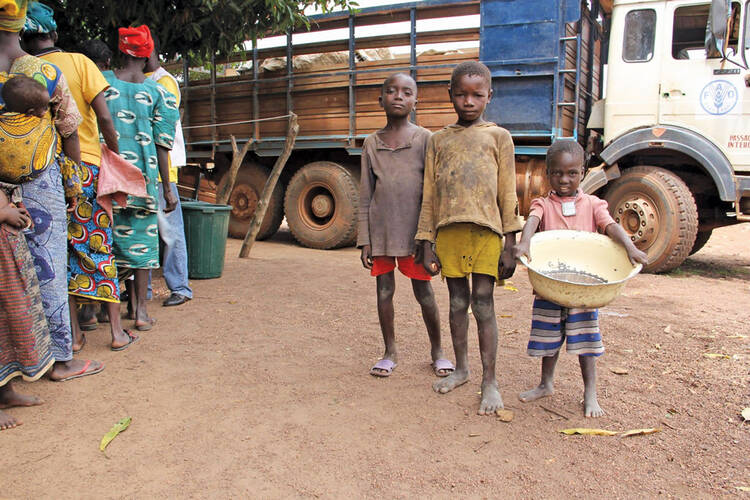BANGUI, Central African Republic—The truck lurches and weaves with every rut and gully on the bush trail—and there are many of them—in slow but steady progress toward the outlying villages around the city of Bossangoa in northern Central African Republic. A day earlier two large lorries broke down repeatedly during the same exercise, and this morning, May 3, an adroit mechanic cannibalized parts from a third vehicle to ensure that the others would make it into the bush and back again. The cargo it carries each patient kilometer—corn and peanut seed meant to salvage the growing season—is a precious, life-saving weight.
“We could be looking at a famine in the Central African Republic in August,” says Kyla Neilan, a program manager for Catholic Relief Services based in Bossangoa, a community hard hit by the months of disorder and communal violence in Central African Republic. “It’s make or break this harvest season. If people have food to eat in August, they can start to recover. If people don’t have seeds in the ground now, and they have no crop in August…people will start to die.”
Catholic Relief Services and Caritas, the church’s international relief and development agencies, aim to get seed along with cultivation tools to as many as 10,000 families in the subsistence farming villages that surround Bossangoa by the end of May. The rainy season has already begun; soon these hard copper-colored trails will become essentially impassable red mud that will leave truck wheels spinning futilely. By then it will be too late to sow.
The hunger is already upon these villagers. In nearby Bamzenbe, Doctors Without Borders is treating children suffering from acute malnutrition or opportunistic infections their hungry bodies are too weak to resist, Neilan reports.
Next year, with another harvest missed, hunger will become a mortal menace to thousands of people. Last year in this northern region of the republic, Seleka rebels—joined by allies among the Peuhl, a nomadic tribe of cattle herders, long at odds over land use with the region’s farmers—swept through these villages. Everything was looted: seed, food, small livestock and tools. Huts were pillaged and put to flame and people were burned to death as the survivors fled into the bush, where many still remain.
“They got attacked last year during the harvest season,” says Neilan, “which means a lot of the crops went uncultivated and unharvested.” Crops that did come in were trampled and eaten by Peuhl cattle, usually prevented from grazing on farmlands by the villagers.
The soudure, the “lean season,” has happened throughout the country “every year for eons, just before the harvest season,” says Neilan, when villagers have exhausted all resources on cultivation and growing and in the last months before the harvest are reduced to barest subsistence—“one or two meals a day, maybe eating just manioc.”
“But then the harvest comes in and, boom, they’ve got food to eat, they have something to sell, so they have an income, they can buy medicine, they can buy whatever else it is that they need.”
People in these villages, she explains, are experiencing an early, man-made soudure, with months to go before a chance to replenish and to eat.
“We are giving out seed. If they get the seed in the ground before the end of planting season, before the rains are done, they’ll have a harvest in August [and] we can stop this downward cycle,” says Neilan. “It is not going to be a full harvest. We’re not able to give everybody enough seed so that they can completely recover everything, but it will be something where they can stop, they can have enough, they can have something to sell, something to eat and can start to rebuild their lives.”
More coverage of the crisis in the Central Africa Republic, included podcasts and photos, available here.








